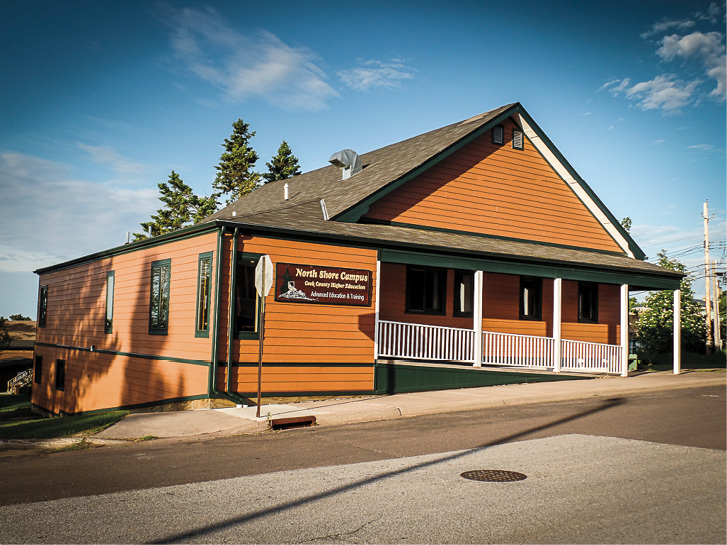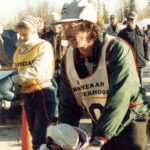As winter sets in and in-person activities are still on hold, many lifelong learners are using the opportunity to take on a new skill. One option to fill the chilly winter days? Learn (or brush up on) another language. This winter Cook County Higher Education (CCHE) is helping people do just that by offering classes in Anishinaabemowin.
Over the years, CCHE has offered many language classes for lifelong learners, including Anishinaabemowin. While it has been a few years since it was offered as a language, this winter there will be two Anishinaabemowin classes—one for beginners and one for more advanced learners—that will broaden students’ language skills and cultural awareness.
Kelsey Kennedy, Program Director for CCHE, said that plans to revive local Anishinaabemowin classes were in the works when the Covid-19 pandemic hit, which required a pause to rework what would have been in-person instruction into an online format. In the interim, CCHE promoted free classes and other learning opportunities from other areas, as well as online resources like the Manitou Mounds Facebook page, which posts a phrase of the day in Anishinaabemowin, many of which are relevant to the current seasons or events.
“It’s such a blessing seeing language being used in a phrase or context,” said Kennedy. “Learning phrases that can be applied in real life means so much more than learning a few individual words.”
Now, CCHE is ready to begin its online classes. The Beginning Anishinaabemowin class is open to anyone, with no prior experience required. The class is being taught by Chelsey Commisio, who works for the Niiji Indigenous Mentorship Program at Lakehead University in Thunder Bay. Commissio is herself a graduate of Lakehead University and her work with Niiji involves planning programming for Indigenous high school students, including teaching some Ojibwe courses.
As many language learners discover, one of the values in learning Anishinaabemowin comes not just from gaining linguistic knowledge but from learning about the greater context of the language, including the culture, history and current happenings of Indigenous people. Commissio said that many words and phrases in Anishinaabemowin have no direct English translation, and that using the language includes embracing the culture and its understanding of the world.
“By providing these teaching to new generations, the Anishinaabe culture and identity can continue to survive and thrive in today’s society,” Commissio said.
In addition to the beginner-level course, CCHE is also offering a class for learners who already have prior Anishaabemowin skills. The class will be taught by Erik Redix, who teaches Anishinaabemowin at the Oshki Ogimaag Charter School in Grand Portage. Both this class and the beginner-level class will be conducted over Zoom, with four classes that last 90 minutes each.
Kelsey Kennedy said that the offering of Ojibwe language courses comes alongside other recent related course offerings including a discussion of Walking the Old Road with author Staci Drouillard, a course on the history of tribes in Minnesota, and a course on the history of treaties in Minnesota, which reached over 750 people from across the country.
“We listen to what the community wants and a lot of these topics are especially pertinent right now,” Kennedy said. “It’s important to understand that anywhere you live, you’re living on Native land. Often people think of tribal governments and lands like they’re another city or county, but they are sovereign lands and part of a much larger governmental body. That is so important to talk about now, and to know about the influences of the treaties and how those affect life today. The better understanding we have, the better we can move forward.”
Kennedy said that CCHE has partial and full scholarships available so that classes can be accessible to everyone. Additionally, anyone who has an interest in seeing a certain course offered in the future is encouraged to contact CCHE to propose the idea. Those interested in learning more about the courses can visit: mycche.org.
Some Words and Phrases in Anishinaabemowin
- Boozhoo – Hello.
- Miigwech – Thank you.
- Aaniin ezhi-ayaayan? – How are you?
- Aandi wenjibaayan? – Where are you from?
- Mino-nibaan – Sleep well.
- Mino giizhigan – It is a nice day.
- Awan – It is foggy.
- Bagakaagonagaa – There is bright snow.
Helpful Resources for Language Learners
Ojibwe People’s Dictionary: ojibwe.lib.umn.edu
Phrase of the Day: facebook.com/theplaceofthelongrapids






